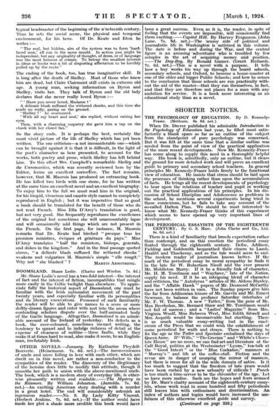OTHER NOVELS.—January. By Katharine Pleydell- Bouverie. (Heinemann. 7s. 6d. net.)—The
inconveniences of uncle and niece falling in love with each other, which are dwelt on in this novel, are rather a non-conductor to the sympathies of the reader. The discovery of the illegitimacy of the heroine does 'little to modify this attitude, though it smooths her path to union with the above-mentioned uncle. The book, which is a modern story of everyday life, is other- wise pleasantly written and readable.—The Mystery in the Ritsmore. By William Johnston. (Jarrolds. 7s. 8d. net.)—An exciting American story dealing with a murder in a great hotel. The end will considerably astonish an ingenuous reader.—No. 3. By Lady Kitty Vincent. (Herbert Jenkins. 7s. 6d. net.)—If the author could have made her plot a shade more credible this book would have
been a great success. Even, as it is, the reader, in spite of feeling that the events are impossible, occasionally find them exciting. Capitol Hill. By Harvey Fergusson. (John -Lane. 7s. 6d. net.)—The 'seamy side of political and journalistic life in Washingthri is 'satirized in this volume. The date is before and during' the War, and the central figure is an amusing adventurer who is troubled by few scruples in the art of acquiring money and position. The Day-Bay. By Ronald Garner. (Grant Richards. 7s. 6d. net.)—This is a novel with a purpose. It tells how a boy works his 'way up through the board schools, secondary schools, and Oxford, to become a house-master at one of the older and bigger Public Schools; and how he comes to the conclusion that those schools are run practically with- out the aid of the master—that they run themselves, m fact, and that they are therefore not places for a man with any ambition for service. It is a book more interesting as an educational study than as a novel.










































 Previous page
Previous page